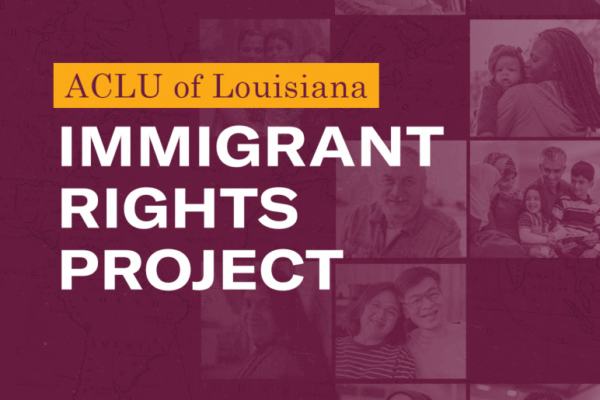FOR IMMEDIATE RELEASE
Monday, October 6, 2025
Media contact: Jesse Vad, [email protected]
BATON ROUGE, LA — The American Civil Liberties Union of Louisiana and Robert F. Kennedy Human Rights today filed a petition for writ of habeas corpus on behalf of Oscar Amaya, an immigrant who has been granted protection from deportation but remains indefinitely detained at Camp 57, the newly opened immigration detention center at Angola prison, Louisiana State Penitentiary.
The legal challenge argues that Amaya’s continued detention violates the Double Jeopardy Clause and due process protections of the U.S. Constitution. After serving his full criminal sentence for past convictions, Amaya has been held in immigration detention for more than six months since being granted Convention Against Torture (CAT) protection, exceeding the presumptively reasonable detention period established by the U.S. Supreme Court in Zadvydas v. Davis.
"Our Constitution is clear: no person can be punished twice for the same offense," said Alanah Odoms, executive director of the ACLU of Louisiana. "Amaya already served his time for his criminal convictions. Keeping him locked up indefinitely in one of the most notorious prisons in America amounts to a de facto life sentence without any due process. That's unconstitutional and cruel."
Amaya, who has lived in the United States for 20 years and fled Honduras in 2005, was granted CAT protection after demonstrating he would face torture if returned to his home country. Because he cannot be deported to Honduras or any other country that would accept him, the federal government appears to be holding him indefinitely at Camp 57.
"Treating immigration detention as criminal punishment and slinging out de facto life sentences at a notorious state penitentiary goes directly against what the Constitution stands for," said Nora Ahmed, legal director for the ACLU of Louisiana. "If the administration can lock someone up for life without a hearing simply because they're an immigrant with a past conviction, the Constitution becomes meaningless."
“Acting with a complete disregard for constitutional protections and dehumanizing immigrants in the process is barbaric,” said William Quigley, emeritus professor of law at Loyola University New Orleans. “If our justice system doesn’t put a halt to these flagrant violations, the Constitution is effectively dead.”
“Camp J is notorious within Angola as a place of isolation, torture, and suffering – both for the people who lived there and the staff who worked there," said Andrea Armstrong, Dr. Norman C. Francis Distinguished Professor of Law, Loyola University New Orleans. "Re-opening Camp J after its closure in 2018 ignores this brutal history and further isolates immigrants from the courts."
"Oscar already served his time. But instead of releasing him, the U.S. government traded one jail for another, condemning him to so-called 'civil detention' at a facility once known as America's bloodiest prison," said Sarah Gillman, Director of Strategic U.S. Litigation at Robert F. Kennedy Human Rights. "This case isn't just about Oscar - it's about our country's foundational principles. If he stays behind bars indefinitely, the Constitution becomes nothing more than a house of cards."
The petition was filed in the U.S. District Court for the Middle District of Louisiana.
About the ACLU of Louisiana: The ACLU of Louisiana leads the charge to protect the civil rights and liberties of Louisianians, especially those most marginalized and historically harmed. True to our founding during the Civil Rights Movement, we are fearless in the face of intimidation and fight tirelessly to protect and empower Louisiana’s Black, Brown, Immigrant, and LGBTQ+ communities. We are part of a nationwide network of affiliates working in courts, legislatures, and communities in all 50 states, Puerto Rico, and Washington, D.C.
About Robert F. Kennedy Human Rights: We are a nonpartisan, not-for-profit organization that has worked to realize Robert F. Kennedy's dream of a more just and peaceful world since 1968. In partnership with local activists, we advocate for key human rights issues—championing change makers and pursuing strategic litigation at home and around the world. And to ensure change that lasts, we foster a social-good approach to business and investment and educate students about human rights and social justice.
Stay Informed
Sign up to be the first to hear about how to take action.
By completing this form, I agree to receive occasional emails per the terms of the ACLU’s privacy statement.
By completing this form, I agree to receive occasional emails per the terms of the ACLU’s privacy statement.

